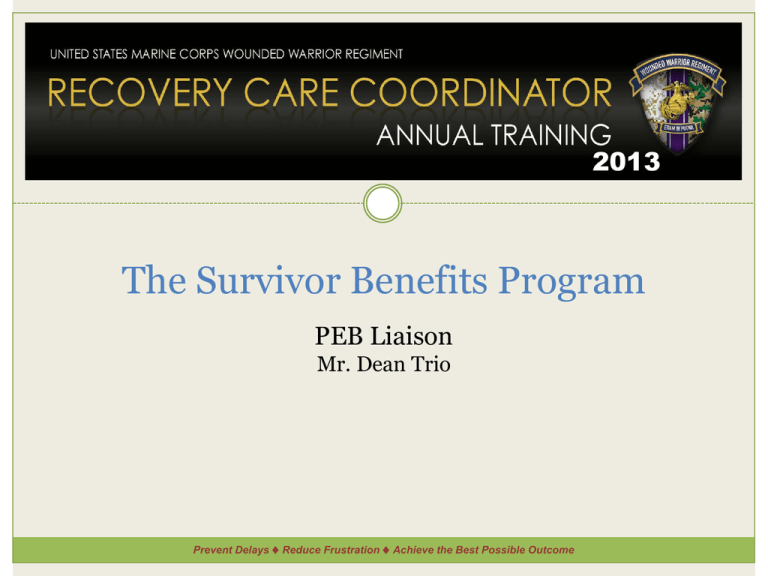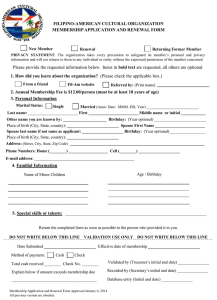Survivor Benefits Program (SBP) Overview for Marines
advertisement

2013 The Survivor Benefits Program PEB Liaison Mr. Dean Trio Prevent Delays ♦ Reduce Frustration ♦ Achieve the Best Possible Outcome Terminal Learning Objectives 2 As an RCC help Marines and families… Prevent Delays N/A – Marines will be automatically enrolled in the SBP at transition unless they opt out Provide basic factual information and discuss the program with Marines and families Explain each of the SBP election options to Marines and families Clearly outline the steps needed to opt out of the program Reduce Frustration Achieve the Best Possible Outcome Provide Marine with sufficient information and lead time to make an informed decision Assist the Marine with finding a Notary Public if necessary Follow-up on steps to ensure Marine properly executes his or her elections Prevent Delays ♦ Reduce Frustration ♦ Achieve the Best Possible Outcome Enabling Learning Objectives 3 Identify the six possible SBP coverage elections Define a “base amount” Describe the basic pros and cons of the program Describe the impact of a “suspended” SBP coverage Identify life events that can cause SBP coverage to be suspended or reinstated Identify all of the circumstances which allow Marines to change SBP elections after retirement Identify the forms used to make an SBP election Describe how the SBP and DIC offset works Identify the elections that a married Marine can make without spousal concurrence Describe at least three ways that Marines are educated about SBP Describe the process for making an SBP election Identify the resources available to help Marines make an informed decision Prevent Delays ♦ Reduce Frustration ♦ Achieve the Best Possible Outcome Benefit Profile 4 Frequency 70% of Marines in the Recovery Care Program will become eligible for the SBP and must make an election Every Marine who retires (PDRL, TDRL, non-medical retirement) is eligible. Drawbacks Changes to the initial SBP election are heavily restricted and a Marine may be “stuck” with a decision that no longer makes financial sense Unlike a life insurance policy, nobody will receive any money from SBP if the beneficiary dies before or at the same time as the Marine. Family members who ultimately are entitled to both the VA’s Dependent Indemnity Compensation (DIC) and the Survivor Benefit Program will have their SBP offset (with premium reimbursement) Importance to Marines The lifetime premiums and/or the lifetime benefit could exceed $100,000. Challenges The SBP election is made right at the point of transition when a Marine’s attention is divided. For a married Marine to decline SBP (or opt for less than full coverage) the spouse must concur in writing. This must be notarized. The best election is never known with certainty because future life events are not known with certainty; the decision must weigh pros and cons, risks and rewards Prevent Delays ♦ Reduce Frustration ♦ Achieve the Best Possible Outcome Rules of the Road 5 Provide basic factual information about the program, its benefits and its drawbacks Encourage the Marine and family to consider carefully when making an election Ensure Marine completes SBP training through MarineNet and attends Seps/TAPS class Ensure the Marine and family understand the program if they make a decision that does not appear to be in their best interest Tell a Marine whether or not it is in his best interest to enroll in the SBP Referee in the event that the Marine and spouse do not agree on a course of action Prevent Delays ♦ Reduce Frustration ♦ Achieve the Best Possible Outcome SBP Process Overview 6 Educate Elect Follow-Up Attend Seps/TAPS class Complete DD Form 2656 Keep D-FAS informed of address changes Review WWR fact sheet Obtain spouse’s notarized signature (certain elections) Notify D-FAS of divorce, remarriage (self or spouse), birth or death of children Review Military Benefits Website Complete DD Form 2656-1 (certain elections) Promptly consider changes to elections when eligible – windows to change are rare Take Mandatory SBP Training on MarineNet Prevent Delays ♦ Reduce Frustration ♦ Achieve the Best Possible Outcome The SBP Election 7 Prevent Delays ♦ Reduce Frustration ♦ Achieve the Best Possible Outcome The Challenge 8 An informed decision on SBP elections must account for the unknown Ability to change elections after retirement is greatly restricted Whether the program will “pay-off” depends on several unknown factors including life changes (divorce, remarriage, birth of children) as well which members of the family outlive the Marine and by how long Prevent Delays ♦ Reduce Frustration ♦ Achieve the Best Possible Outcome Pros and Cons of SBP 9 Pros Cons Instead of a lump sum, Changes to election are the benefit is in monthly installments – amount will be greater if death is sooner Program pays out more than it takes in (net subsidy) No proof of health required heavily restricted In some cases there is no benefit paid Premium rates assume a max of 30 years of premiums (but medically retired Marines may pay 50!) Prevent Delays ♦ Reduce Frustration ♦ Achieve the Best Possible Outcome Multi-Faceted Decision 10 The SBP Election is more than a simple yes or no. Marine elects the type of coverage • • • • • • Spouse Only Spouse and Child Child Only Insurable Interest Former Spouse Former Spouse and Child Marine elects the “base amount” • • • Minimum is $300 Maximum is full retired base pay Benefit will be 55% of “base amount” Note: If the Marine is married at the time of retirement, the spouse must concur with any combination of elections other than: • • Spouse Only – full retired base pay, or Spouse and Child – full retired base pay Prevent Delays ♦ Reduce Frustration ♦ Achieve the Best Possible Outcome Six SBP Elections Note on Premiums Premiums are not due in any case if: • The Marine is at least 70 years old, and • The Marine has paid at least 30 years of premiums 11 Coverage Premiums are due when… Spouse • Benefits are paid when… Marine is lawfully married • Marine’s lawful spouse at the time of the Marine’s death: • Is alive, and • Is not currently remarried (unless the marriage occurred after the age of 55) Any legal spouse Note: premiums will be suspended upon divorce or death of the spouse, but will be reinstated if the Marine remarries Child Only • Marine has at least one child who is: • The Marine’s legal dependent, and • Under age 18, or • Under age 23 and a full time student, or • Permanently disabled if the disability occurred when the child was otherwise eligible • Marine has at least one child who was: • The Marine’s legal dependent at the time of the Marine’s death, and remains • Under age 18, or • A full time student under age 23, or • Permanently disabled if the disability occurred when the child was otherwise eligible • Premiums would be due if the Marine elected • Spouse Only, or • Child Only coverage • To the spouse when: • The spouse is eligible per the Spouse Only rules above To the children (in equal shares) when: • There is no eligible spouse beneficiary, and • There is at least one child eligible under the Child Only rules Any eligible child Note: eligible children will split the benefit equally Spouse and Child Any legal spouse / eligible child • Note: premiums will be reduced when only children are eligible Former Spouse • Former Spouse is not currently remarried (unless the marriage occurred after the age of 55) • Former Spouse is not currently remarried (unless the marriage occurred after the age of 55) • • Former Spouse is not remarried, or Marine has at least one child who is: • From his marriage to his Former Spouse, and • Meets all of the other criteria in the Child Only plan • • Former Spouse is not remarried, or Marine has at least one child who is: • From his marriage to his Former Spouse, and • Meets all of the other criteria in the Child Only plan • Designated beneficiary is alive • Designated beneficiary is alive A specific person identified on DD Form 2656-1 Former Spouse and Child A specific person identified on DD Form 2656-1 and the children of that marriage Insurable Interest A specific person Can only be selected if Marine is unmarried and has no dependent children or one dependent child Prevent Delays ♦ Reduce Frustration ♦ Achieve the Best Possible Outcome Suspended Status 12 With certain SBP elections, future life events may result in the SBP being suspended, and possibly reinstated While SBP is suspended… • • No premiums are paid by the Marine No benefit is paid in the event of the Marine’s death Suspension events include… • • • Death of spouse Divorce of Marine and Spouse Death or “aging-out” of all children SBP is reinstated if a new eligible beneficiary is created or the original beneficiary becomes eligible again; reinstatement events include… • • Remarriage of Marine (at any age) Birth (or adoption) of another child Note: Marine is responsible for notifying D-FAS of life events which would suspend or reinstate SBP. Failure to notify always works to the Marine’s detriment – i.e., premiums collected will not be repaid to the Marine; however, benefits will not be paid out even if premiums were collected if there is no eligible beneficiary. Prevent Delays ♦ Reduce Frustration ♦ Achieve the Best Possible Outcome Suspension and Reinstatement Events Marine is responsible for notifying DFAS of all relevant life eventsc 13 Coverage Automatic Suspension Events Spouse • • Marine and spouse divorce Death of spouse Automatic Reinstatement Events • Marine remarries at any age All of the Marine’s legally dependent children are too old to be beneficiaries (based on full time student status) The Marine has no more living children who are legal dependents • • Marine has another dependent child A dependent child between the ages of 18-23 goes back to school full time The suspension criteria for both… • Spouse Only election, and • Child Only election …are met • The reinstatement events for either… • Spouse only election, or • Child only election …are met Note: in the event of divorce the Marine has one year to convert the Spouse Only SBP election to Former Spouse Only Child Only • • Spouse and Child • Note: in the event of divorce the Marine has one year to convert the Spouse and Child SBP election to Former Spouse and Child Former Spouse • Former Spouse remarries before the age of 55 • Former Spouse’s remarriage ends through divorce, annulment or the death of the new spouse Former Spouse and Child • • Former Spouse remarries before the age of 55, and All of the Marine’s legally dependent children from the marriage with the Former Spouse have “aged-out” or passed away • • Either the Former Spouse’s remarriage ends, or One of the children from the marriage between the Marine and the Former Spouse who is between the ages of 18-23 returns to school full time Insurable Interest • N/A • N/A Prevent Delays ♦ Reduce Frustration ♦ Achieve the Best Possible Outcome Cancellation or Conversion of SBP 14 Coverage Events Allowing Cancellation or Reduction Spouse • Allowed between the 24th and 36th months of retirement DIVORCE: Can convert to Former Spouse Only Child Only • Allowed between the 24th and 36th months of retirement N/A Spouse and Child • Allowed between the 24th and 36th months of retirement N/A Former Spouse • • At any time, however Former spouse must concur if election of Former Spouse Only coverage was part of divorce proceedings *If the initial Former Spouse election was made because of a divorce agreement, the Marine may make another election when the Spouse concurs with termination of Former Spouse election Former Spouse and Child • • At any time, however Former spouse must concur if election of Former Spouse and Child coverage was part of divorce proceedings • ??? Insurable Interest • At any time • N/A No Participation • N/A • Marine can begin participation within 12 months of marriage, provided • Marine has never previously enrolled in SBP, and • Marine had no eligible dependents (spouse or children) at the time of retirement Marine can begin participation within 12 months of the birth of his or her first dependent child, provided: • Marine has never previously enrolled in SBP, and • Marine had no eligible dependents (spouse or children) at the time of retirement Marine is responsible for notifying DFAS of all relevant life events Events Allowing Conversion • Prevent Delays ♦ Reduce Frustration ♦ Achieve the Best Possible Outcome Calculating the Premiums 15 Coverage Factors Included Are: Premium Adjusts When… Spouse • SBP “Base Amount” elected • Annual Cost of Living Adjustment Child Only • SBP “Base Amount” elected • Age of Marine • Age of youngest eligible child • Annual Cost of Living Adjustment • Birth of new eligible child • Youngest child “ages-out” or passes away Spouse and Child • • • • Former Spouse • SBP “Base Amount” elected Former Spouse and Child • • • • Insurable Interest • SBP “Base Amount” elected • Age difference between the Marine and the beneficiary SBP “Base Amount” elected Age of Marine Age of youngest eligible child Premiums are reduced when only the spouse remains eligible or only children remain eligible SBP “Base Amount” elected Age of Marine Age of youngest eligible child Premiums are reduced when only the former spouse remains eligible or only children remain eligible • Annual Cost of Living Adjustment • Birth of new eligible child • Youngest child “ages-out” or passes away • Annual Cost of Living Adjustment • Annual Cost of Living Adjustment • Annual Cost of Living Adjustment Prevent Delays ♦ Reduce Frustration ♦ Achieve the Best Possible Outcome Calculating the Premium 16 The amount of the premium will vary significantly based on the SBP election SCENARIO: Marine is 43, Spouse is 41, children are 13 and 10. He is considering several SBP options and wants to know what his premium would be for a $2000 base amount. Program Premium Spouse Only $130.00 Spouse and Child $130.46 Child Only $7.80 RCCs should be careful not to quote exact premiums or benefits as SBP has many nuances; however, this is example is provided to illustrate the wide variation in premium amounts. Marines may be referred to the DoD’s military pay website: http://militarypay.defense.gov/survivor/sbp/in dex.html Prevent Delays ♦ Reduce Frustration ♦ Achieve the Best Possible Outcome DIC Primer 17 What is DIC? • Dependent Indemnity Compensation (DIC) is a VA program that pays to the eligible family members a tax exempt survivor benefit after the death of certain retired or separated Marines receiving VA compensation. Note The surviving family member(s) must apply for DIC, payment is not automatic In what cases will eligible family members receive DIC? • Death stems from a service connected disability for which the Service Member was receiving VA compensation (or was entitled to it) • Service Member was rated as completely and permanently disabled by the VA at any point • Service Member was rated as 100% disabled by the VA for at least 5 years Challenge Whether the family will ultimately be eligible for DIC is normally uncertain when the SBP election is made If a Marine’s death meets the criteria above, who are the eligible family members for DIC? • DIC follows the same rules as the SBP Spouse and Child election in determining the appropriate recipient; the one exception is that the remarriage age is 57 instead of 55. Prevent Delays ♦ Reduce Frustration ♦ Achieve the Best Possible Outcome SBP/DIC Offset 18 A family member eligible for both SBP payments and DIC payments will see the SBP offset • DIC is tax exempt so they still come out ahead • Family member is reimbursed for a portion of the SBP premiums paid (essentially turning these premiums into an interest free loan from the Marine to the Government) However, if the SBP and DIC beneficiaries are different family members, there is no offset • For example, this means that a Marine who is terminally ill, married, and has at least one child must carefully weigh the Spouse and Child vs Child Only SBP options. Also, if the SBP beneficiary is receiving DIC for a different service member (such as a Former Spouse), there is no offset Prevent Delays ♦ Reduce Frustration ♦ Achieve the Best Possible Outcome SBP and TDRL 19 If the Marine’s final DoD rating when he is transferred to the PDRL differs from the initial rating, this may affect SBP If the Marine elected… Coverage will… Premiums will… Benefit will… Full Gross Retired Pay Automatically change to the new Full Gross Retired Pay Go up or down accordingly Go up or down accordingly Reduced Base Amount Higher than the new Full Gross Retired Pay Automatically change to the new Full Gross Retired Pay Go down accordingly Go down accordingly Reduced Base Amount Lower than the new Full Gross Retired Pay Be unchanged Be unchanged Be unchanged Prevent Delays ♦ Reduce Frustration ♦ Achieve the Best Possible Outcome The Election Process 20 Prevent Delays ♦ Reduce Frustration ♦ Achieve the Best Possible Outcome Automatic Enrollment 21 Any Marine who retires is automatically enrolled in the SBP unless he opts out Marine must decline in writing If the Marine is married, the spouse must also decline by writing a notarized letter Marine must opt out before retirement date or he will be in the program until a rare amnesty occurs Prevent Delays ♦ Reduce Frustration ♦ Achieve the Best Possible Outcome SBP Election Process 22 Click the box to see a DD 2656 Start Marine educated on SBP Marine makes election on DD 2656 Single? Benefit elections honored Yes No Every Marine who retires (regular retirement, TDRL, or PDRL) must make an SBP Election SBP education is conducted through: • Seps/TAPS class • Fact sheets • Discussions with RCC • Mandatory training through Marine Net online DD 26561 must also be completed to elect Former Spouse or Former Spouse and Child Electing Spouse or Spouse and Child ? No Yes Electing Full Retired Base Pay? Yes No Spouse must sign DD 2656 in front of notary public Spouse concurs with Notary? No If a Marine does not complete the DD 2656, does not fill out the SBP section, or makes an election requiring spouse consent without obtaining it, he will be enrolled in the max benefit Prevent Delays ♦ Reduce Frustration ♦ Achieve the Best Possible Outcome Yes Marine enrolled in max SBP Responsibility to Keep D-FAS informed 23 Failure to keep D-FAS informed of life events and / or mailing address can hurt the Marine SCENARIO 1: A Marine who elected Spouse only SBP coverage is divorced in January 2013 but he never notifies D-FAS. D-FAS will continue to take premiums out of his retirement pay. However, if the Marine dies, the now Former Spouse will not receive any benefit. SCENARIO 2: A Marine who elected Spouse Only SBP coverage is divorced in January 2013 and notifies D-FAS. He does not convert to Former Spouse Only so his policy is put into suspended status. He remarries in January 2021 but does not notify DFAS. However, DFAS discovers this in 2025. They will bill him for four years of premiums! Prevent Delays ♦ Reduce Frustration ♦ Achieve the Best Possible Outcome Key Points for Marines Eligible for SBP 24 Timely Decisions Family Decision Keep DFAS Informed • Marines need to make their election prior to retirement • Marines should take MarineNet training and read up on SBP • Enrollment is automatic if not declined • Spouse must concur (notarized signature on DD Form 2656) if less than full SBP is elected • Marines must inform DFAS of life events and address changes Prevent Delays ♦ Reduce Frustration ♦ Achieve the Best Possible Outcome Common Pitfalls Uninformed Decisions Discussion: How can an RCC help avoid these pitfalls? • A Marine makes an SBP election without understanding what he is signing up for • A terminally ill Marine declines SBP because he heard from fellow Marines that is not a good program • A Marine doesn’t realize he needs his wife’s signature to be notarized until the day he is trying to check out • A Marine whose retirement pay is fully offset by VA Disability Compensation doesn’t realize he is receiving SBP until he receives a bill in the mail 25 Prevent Delays ♦ Reduce Frustration ♦ Achieve the Best Possible Outcome Resources 26 Basic Resources Advanced Resources Seps/TAPS class SBP is covered DoD Military Pay Website http://militarypay.defense.gov/survivor/sbp/inde x.html Marine Net SBP Training Mandatory Online Training Wounded Warrior Regiment PEB Liaison Dean Trio 703-432-1856 WWR External Fact Sheet https://ehqmc.usmc.mil/sites/wwr/wrc/External% 20Fact%20Slick%20Sheets/Survivor%20Benefit%2 0Plan%20Slick%20Sheet.pdf WWR Internal Fact Sheet https://ehqmc.usmc.mil/sites/wwr/wrc/Internal% 20Slick%20Fact%20Sheets/Survivor%20Benefit%2 0Plan%20Fact%20Sheet.pdf Prevent Delays ♦ Reduce Frustration ♦ Achieve the Best Possible Outcome Knowledge Check 27 Sgt Monteith is transferred from active duty to the PDRL Gross Retired Pay of $2000. What is the highest base amount that she can elect for SBP? $300 $1100 $2000 It depends on her DoD disability rating Prevent Delays ♦ Reduce Frustration ♦ Achieve the Best Possible Outcome Knowledge Check 28 PFC Popovich is married with no children when he is transferred from active duty to the PDRL. Because he never completes the DD Form 2656 properly he is enrolled in the Spouse Only benefit. When will he be able to cancel this election? Anytime within the first 90 days Between the 24th and 36th months of retirement Within 12 months of his divorce, if he divorces his spouse Within 12 months of the birth of his first child, if he has one A and B only B and C only C and D only B, C, and D only None of the above – he can never cancel this election Prevent Delays ♦ Reduce Frustration ♦ Achieve the Best Possible Outcome Knowledge Check 29 Sgt Cumberstock is about to be transferred to the TDRL. He is currently married (for the first time), and has a total of three children, including one with a previous girlfriend and two with his wife. He wants to open a business with his brother. What elections are available to him? Spouse Only Spouse and Child Child Only Insurable Interest (for the brother) A and B only A, B, and C only B only B and D only All of the above Prevent Delays ♦ Reduce Frustration ♦ Achieve the Best Possible Outcome Knowledge Check 30 GySgt O’Donnell is in his second marriage when he retires. After retirement he divorces his second wife, remarries and has a child with his third wife. He and his wife then both die in a car crash when their child is 1 year old. Under which scenarios will this child automatically receive SBP benefits? Original election was Former Spouse (1st wife) and Child and this was never terminated Original election was Spouse and Child and no changes were made when he divorced his second wife Original election was Spouse and Child and this was converted to Former Spouse (2nd wife) and Child when he divorced his second wife Original election was Child Only D only B and D only B, C, and D only All of the above None of the above Prevent Delays ♦ Reduce Frustration ♦ Achieve the Best Possible Outcome Knowledge Check 31 SSgt Jacobs, a married Marine with one child completes the DD Form 2656 electing Child Only with his full retired base pay as the base amount. His wife does not sign the DD Form 2656. In which program is he enrolled? Spouse Only Spouse and Child Child Only He will not be enrolled in any SBP programs Prevent Delays ♦ Reduce Frustration ♦ Achieve the Best Possible Outcome Knowledge Check 32 PFC Bivens is in the IDES when he is arrested for aggravated assault. He is disenrolled from the IDES and administratively separated from the Marine Corps. Can he enroll in SBP? Yes No Prevent Delays ♦ Reduce Frustration ♦ Achieve the Best Possible Outcome Knowledge Check 33 PFC Montalvez is transferred to the PDRL at the age of 19. He enrolls in the Spouse and Child SBP program. Assuming he and his 18 year old wife both life to age 90 and never divorce, when will his SBP premiums stop? In 30 years, when he is 49 In 51 years, when he is 70 In 71 years, when he passes away He is too young to enroll in the SBP Prevent Delays ♦ Reduce Frustration ♦ Achieve the Best Possible Outcome Knowledge Check 34 In which circumstances will SBP be offset? If any family member of the Marine is receiving DIC from the VA for the same deceased Marine If any family member of the Marine is receiving DIC from the VA for any deceased Service Member, including the Marine If the same family member who is eligible to receive SBP is also receiving DIC from the VA for the same deceased Marine If the same family member who is eligible to rececive SBP is also receiving DIC from the VA for any deceased Service Member, including the Marine Prevent Delays ♦ Reduce Frustration ♦ Achieve the Best Possible Outcome Knowledge Check 35 Cpl Wyatt is married with one child at the time he is transferred to the TDRL. What paperwork will he need to complete in order to elect Spouse Only – full retired pay base amount? The DD Form 2656 (with or without spouse signature) The DD Form 2656 with his spouse’s notarized signature The DD Form 2656-1 A only B only A and C only B and C only Prevent Delays ♦ Reduce Frustration ♦ Achieve the Best Possible Outcome Knowledge Check 36 1LT Woodkin elects Spouse and Child coverage when he is transferred from active duty to the PDRL. Three years later he and his wife divorce and the divorce agreement states that he will convert SBP to Former Spouse and Child. However, neither he nor the Former Spouse notify DFAS of the divorce. After three more years he passes away. His Former Spouse has not remarried and his only child is now eight. Who, if anyone, receives SBP? The child The Former Spouse (provided she can find a copy of the divorce agreement) The Marine’s estate Nobody Prevent Delays ♦ Reduce Frustration ♦ Achieve the Best Possible Outcome Questions 37 Prevent Delays ♦ Reduce Frustration ♦ Achieve the Best Possible Outcome






